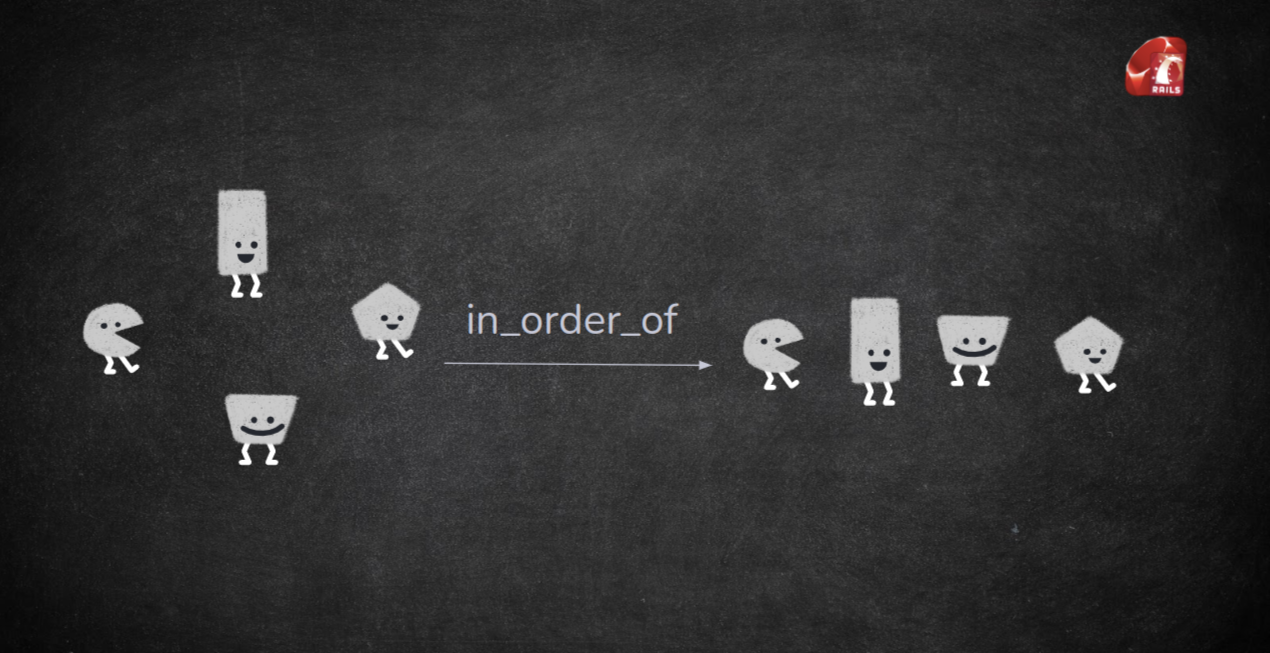

in_order_of
source link: https://blog.kiprosh.com/improvements-to-in_order_of-active-record-query-method-in-rails-7-1/
Go to the source link to view the article. You can view the picture content, updated content and better typesetting reading experience. If the link is broken, please click the button below to view the snapshot at that time.

rails_7 Published on 16 February 2023 16 February 2023 • 3 min read
Improvements to in_order_of active record query method in Rails 7.1
Rails 7 has introduced the in_order_of method which allows to sort records in a specific order. There is a detailed explanation of it in the article Rails 7 adds in_order_of for ActiveRecord::QueryMethods and Enumerable. This is a follow-up article to that one, in which we will explore how the in_order_of method has been improved in Rails 7.1.
Allows to order by string column name
In Rails 7, if a column name is passed to the in_order_of method as a string, it raises the following error:
Loading development environment (Rails 7.0.3)
3.0.0 :001 > CustomerOrder.in_order_of('name', ['Shirt', 'Jeans'])
/usr/share/rvm/gems/ruby-3.0.0/gems/activerecord-7.0.3/lib/active_record/relation/query_methods.rb:459:in `in_order_of': undefined method `in' for "name":String (NoMethodError)
Did you mean? in?
It has been fixed in PR#45971. From Rails 7.1 onwards, we are allowed to pass the column name as a string value to the in_order_of method.
Loading development environment (Rails 7.1.0.alpha)
3.0.3 :001 > CustomerOrder.in_order_of("name", ['Shirt', 'Jeans'])
CustomerOrder Load (0.5ms) SELECT "customer_orders".* FROM "customer_orders" WHERE "customer_orders"."name" IN ('Shirt', 'Jeans') /* loading for pp */ ORDER BY CASE WHEN "customer_orders"."name" = 'Shirt' THEN 1 WHEN "customer_orders"."name" = 'Jeans' THEN 2 END ASC LIMIT ? [["LIMIT", 11]]
=>
[#<CustomerOrder:0x000055cb391a3600
id: 1,
name: "Shirt",
order_status: "Completed",
created_at: Mon, 23 Jan 2023 15:42:08.473523000 UTC +00:00,
updated_at: Mon, 23 Jan 2023 15:42:08.473523000 UTC +00:00>,
#<CustomerOrder:0x000055cb391a3538
id: 2,
name: "Jeans",
order_status: nil,
created_at: Mon, 23 Jan 2023 15:43:03.940857000 UTC +00:00,
updated_at: Mon, 23 Jan 2023 15:43:03.940857000 UTC +00:00>]
Works with nil values
In Rails 7, if nil is passed to the in_order_of method, the following SQL is generated:
Loading development environment (Rails 7.0.3)
3.0.0 :001 > CustomerOrder.in_order_of(:order_status, [nil, 'Completed']).to_sql
=> "SELECT \"customer_orders\".* FROM \"customer_orders\" WHERE \"customer_orders\".\"order_status\" IN (NULL, 'Completed') ORDER BY CASE \"customer_orders\".\"order_status\" WHEN NULL THEN 1 WHEN 'Completed' THEN 2 WHEN ELSE 3 END ASC"
As we can see from the example above, the CASE statement adds a check for WHEN NULL THEN, but NULL != NULL in SQL. As a result, when ordering, records with NULL values are ignored, and those records are excluded from the final result.
In Rails 7.1, The PR#45670 has added a fix to generate SQL WHEN \"customer_orders\".\"order_status\" IS NULL for nil values, which sort records correctly and return records with nil value in the result.
Loading development environment (Rails 7.1.0.alpha)
3.0.3 :001 > CustomerOrder.in_order_of(:order_status, [nil, 'Completed'])
CustomerOrder Load (0.3ms) SELECT "customer_orders".* FROM "customer_orders" WHERE ("customer_orders"."order_status" IN ('Completed') OR "customer_orders"."order_status" IS NULL) /* loading for pp */ ORDER BY CASE WHEN "customer_orders"."order_status" IS NULL THEN 1 WHEN "customer_orders"."order_status" = 'Completed' THEN 2 END ASC LIMIT ? [["LIMIT", 11]]
=>
[#<CustomerOrder:0x000055cb3822b308
id: 2,
name: "Jeans",
order_status: nil,
created_at: Mon, 23 Jan 2023 15:43:03.940857000 UTC +00:00,
updated_at: Mon, 23 Jan 2023 15:43:03.940857000 UTC +00:00>,
#<CustomerOrder:0x000055cb3822b240
id: 1,
name: "Shirt",
order_status: "Completed",
created_at: Mon, 23 Jan 2023 15:42:08.473523000 UTC +00:00,
updated_at: Mon, 23 Jan 2023 15:42:08.473523000 UTC +00:00>]
Using ORDER BY CASE for all
In Rails 7, in_order_of uses the special order field generation, i.e. ORDER BY FIELD for the MySQL adapter. This does not add any performance improvement other than a simplified query, so it has been replaced by ORDER BY CASE.
From Rails 7.1 onwards, all database adapters will now use ORDER BY CASE. The PR#45670 has added this fix, the same PR which has added fix for in_order_of to work with nils.
References:

Supriya Laxman Medankar
Software Engineer at Kiprosh.com
Recommend
About Joyk
Aggregate valuable and interesting links.
Joyk means Joy of geeK
